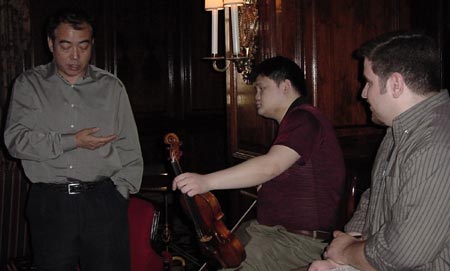|
|
|
| |
 |
|
|
| |
| |
Director CHEN KAIGE talks TOGETHER
We strongly recommend you read the review of TOGETHER before reading this. On June 4, 2003 director Chen Kaige came to Dallas to participate in a round table discussion of his new film TOGETHER. Kaige has directed films like FAREWELL MY CONCUBINE, TEMPTRESS MOON, THE EMPEROR AND THE ASSASSIN, and KILLING ME SOFTLY. The following is a collection of informative answers to various questions asked by those in attendance. There are also specific questions and answers between Mark Walters and Chen Kaige. This is not meant to be a definitive transcript, but rather select bits of info gathered from the event.
When asked about casting the film: KAIGE: We all knew we wanted to find someone who could play instruments before we made sure that he could act. We had a competition starting in Shanghai. I asked my casting director to videotape everything and bring it back. And I watched the tape and I realized... he (Yun Tang) could be the one, and could do this part. I asked him to come to Beijing with his parents, and I talked to him briefly. I didn't really talk with him much at first. I just wanted to make sure that everything would be fresh. Honestly I did alot of talking with him on the set, because many people would say it's a risk casting someone who had never acted before. I personally believe that as long as you can make them able to understand the story, he can do it, and do it well. That's a sort of psychological thing. You can not really force him to do the things he is not able to do, and you have to deal with him very nicely because he's at a difficult age. He was really 13 when we were shooting the film. Then I talked to the guy who played the father (Pequi Liu), and he's a professional actor. He grew up in the big city, but he has to look like a peasant. So he's wonderful, he's really good. And of course my wife plays Lili, and she's big in China. We had never really worked together before. I appreciate her, because she is very supportive. She never really asked for a part before, but I said this time there's a part for you. We kept everything on the set professional, we never really behaved like husband and wife. I think if we did that it would embarrass people around us. On music in his films: KAIGE: Some people say "Oh what a coincidence you always do movies about artists." I don't know, I didn't notice that at all. One thing is true, I think that music is very important in movies that I make. This is what we learn in film school. We want to make a movie that is audibly and visually strong at the same time. I think film is for people to see and listen, not listen to alot of dialogue. I mean you can create alot of different types of sounds on many levels. There is a particular reason for me to do this picture, I'm a big fan of classical music. I pretty often play the piece for myself when I need to think. The pre-production took me something like four months to finish. We pre-record everything. You're going to see the guy that did the soundtrack for us. (referring to Chuanyun Li who was on his way in) I'm pretty familiar with alot of pieces of classical music. I work closely with my music editor, who is also very experienced. It's not really about individual pieces of music, it's about the combination. We hope that the music can help us build up the relationship and establish those characters. The other thing I did was to listen to a certain piece over and over again, for example the Tchaikovsky in D major. I listened to that... I can spend a whole afternoon in a study like this playing it again and again and again, and try to visualize how many takes and how many setups I want in a certain scene. On the difference between small and large films: KAIGE: I allow myself to do different types of movies. I've always imagined myself to be young at heart, and have the advantage to do different types of films. Some people ask "Why do you want to do a small film like this?" It's not the matter of being tired or something. It's tough to work with several thousand extras. You know you get up at 2 o'clock in the morning and be ready to shoot at seven or something. I'm moved, this is a story that needs to be told. I'm going to do it no matter what. This time I was more relaxed, with my crew making jokes on the set, and I was pretty happy in there. Not like when I was doing THE EMPEROR AND THE ASSASSIN and I was screaming this or that. I'm changed. You know with a sense of humor and true happiness you can do things better. I'm pretty thrilled by that.
KAIGE: I think the story is like this. I think that so many Chinese parents want their children to succeed, there is a particular reason. I think the people in my generation always felt they have had loss alot of the time, that they will never ever make themselves have success. That's the story, first off he's a sort of selfish father, always pushing so hard to help his child succeed. But later on we realize that he has another purpose. People ask me why he does this to his son. Because he only receives true respect from his son. The first scene of TOGETHER he wants his son to give suggestions, about what tie and suit he should wear. They're like fathers. Not like son and father, but like fathers. Yes we did that intentionally.
Image copyright UNITED ARTISTS 2003. On directing himself in the movie: KAIGE: It was not fun. I will not do that again, because they give me very strange looks. The people around me make me feel so uneasy that I'm gonna do another take. I was pretty proud of myself, and I'd sit back to view the monitor, and do the playback and look around. I didn't have my own mural that I could look into. My job is to be a mural for the actors. People call me an actor's director.
KAIGE: Now the Hong Kong filmmakers are strong competitors. Obviously they want to share the market. Before 1997 the Hong Kong movies could be seen in the Chinese market by quota. Now there's no quota. They argue "We're Chinese! Hong Kong is now a part of China!" They're right, but they continue to do very sort of commercial films. They still attract the attention from the public. But most of the Chinese filmmakers still want to do art pieces. They don't really have a very strong sense of being commercial directors. They don't want to do that. So they're just day by day losing their market. That's why we say it's a very strong competition. But it's good. MARK: Is it better than it used to be? KAIGE: I think so. At least we can, for example, form our own production company without any major trouble. You can do it as long as you have money. With this kind of system, sooner or later, politically, the control yields. Yeah, I think so.
KAIGE: That's why the movie is called TOGETHER. It's not a direct translation from Chinese. The direct translation would be "BEING WITH YOU", or something like that. So people ask me "Oh that's a very interesting title. Who is this YOU?" And I say that you can imagine, the first professor has his music, dealing with his music. You know, dealing with the fame and the fortune, dealing with your lover or your father, or whoever. Yes, I think that is so.
On what he's doing next: KAIGE: I'm going back to make an epic film. The story is set in an unknown time. I don't know, it's a magic tale. So I don't know what time, it's not in ancient time, and it's not in the future. I don't know. I need to figure it out, but it's going to be a movie with alot of different kind of additives, even action. I describe this movie with three very abstract words: Freedom, Love and Destiny. You will see when I make the film, but I'm going to do that very soon. Hopefully I can start to shoot by the end of this year. It's going to be very big. There's battle scenes. It's going to have a very different approach.
Chuanyun began to play a few selections for us, including a piece by Paganini, and I must say this guy is incredible. You can hear his music in TOGETHER, which he did all of the violin solos for, but until you actually see him play you cannot possibly imagine how astounding his ability is.
One last question for Chen: MARK: Is there a chance you'll be doing any more films in America? KAIGE: Yeah! Yes, definitely. MARK: Thank you so much. It was a wonderful film.
Chuanyun begins to play the NBA theme on the violin, followed oddly enough by the theme to THE X-FILES.
Chen Kaige, Chuanyun Li and Mark Walters at the Adolphus Hotel - June 4th, 2003.
All interview images copyright BIGFANBOY.com 2005, and may not be used without permission
| |
|
This site is best viewed with Internet Explorer at a screen size of 1024x768 All content © 2004 BIGFANBOY.com
|
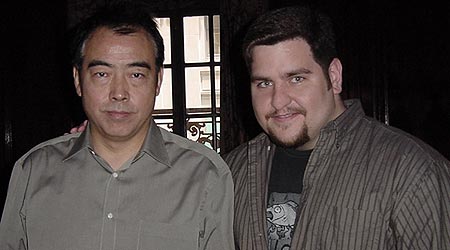
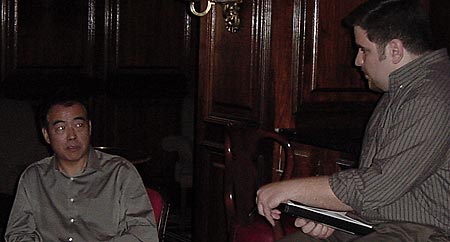
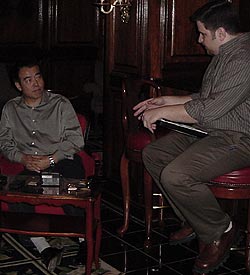 MARK: There's an interesting contrast in the
film, how in the first hour the music really holds the father and son
together, and in the second hour, because of the father wanting his son to
succeed, the music is actually what tears them apart. Was it interesting
trying to create that contrast in the film, and showing how Xiaochun was going
through the transition of enjoying what he did, to finding out that what he
did wasn't as important as who he did it around?
MARK: There's an interesting contrast in the
film, how in the first hour the music really holds the father and son
together, and in the second hour, because of the father wanting his son to
succeed, the music is actually what tears them apart. Was it interesting
trying to create that contrast in the film, and showing how Xiaochun was going
through the transition of enjoying what he did, to finding out that what he
did wasn't as important as who he did it around?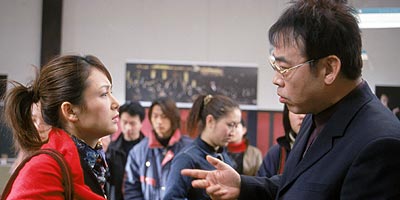
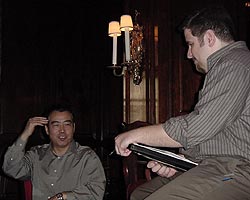 MARK: What would you say is the most major
change you've seen since Hong Kong has reverted to mainland China?
MARK: What would you say is the most major
change you've seen since Hong Kong has reverted to mainland China?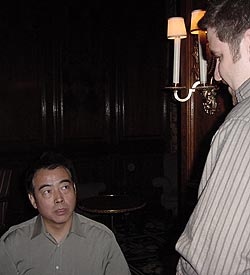 MARK: Every character in the film has
something that drives them to do what they do. Xiaochun has his violin, the
father has his son, Lili has her... clothes. Was it a conscious decision to
exhibit that to where everyone has a driving force so that it hurts when it's
taken away?
MARK: Every character in the film has
something that drives them to do what they do. Xiaochun has his violin, the
father has his son, Lili has her... clothes. Was it a conscious decision to
exhibit that to where everyone has a driving force so that it hurts when it's
taken away?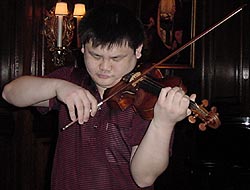 About this time the amazing Chuanyun Li entered the room with his violin.
Chen had him name some NBA teams for us to show how popular sports were
in China. Chuanyun said his favorite team was the Dallas Mavericks!
Kaige said he thought of him as a genius, then joked that maybe it wasn't a
good moment for him to prove it. Chen asked Chuanyun who is going to win in
the NBA this year. Chuanyun's prediction - "Spurs"
About this time the amazing Chuanyun Li entered the room with his violin.
Chen had him name some NBA teams for us to show how popular sports were
in China. Chuanyun said his favorite team was the Dallas Mavericks!
Kaige said he thought of him as a genius, then joked that maybe it wasn't a
good moment for him to prove it. Chen asked Chuanyun who is going to win in
the NBA this year. Chuanyun's prediction - "Spurs"